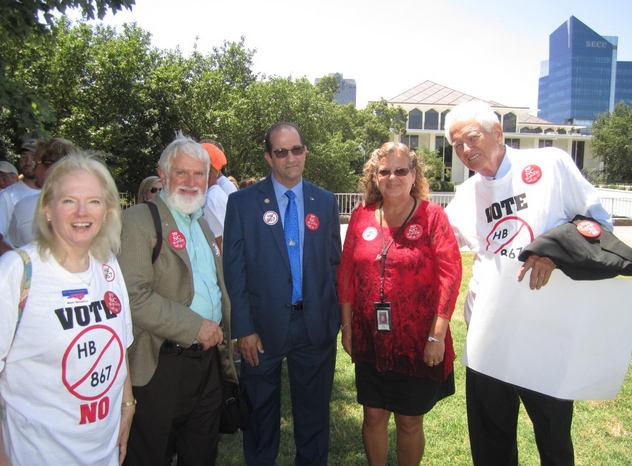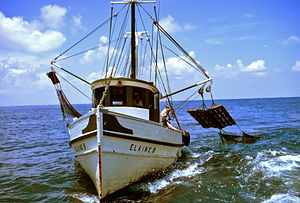There is a song from the musical “Oklahoma” entitled, “The Farmer and the Cowman Should Be Friends.” The song refers to the struggle between those who wanted to use the newly opened lands in the western United States for cattle and those who wanted to use the land for crops. There were some struggles before that issue was resolved. North Carolina faces a similar issue–a struggle between the commercial fishermen and the sports fishermen. At issue is the availability of fresh local seafood and the ability of small family commercial fishermen to earn a living.
Today I went to Raleigh to the legislative buildings (along with about three hundred other people) to talk to our state representatives about House Bill 867, which would have a serious negative impact on the commercial fishing industry in North Carolina. What is being proposed here actually happened in Massachusetts while I was living there. Over- regulation crippled commercial fishing businesses that had been owned by families for generations. The towns of New Bedford and Gloucester were particularly hard hit. I don’t want to see that happen in North Carolina. The Craven County Board of Commissioners has taken a stand on this issue. Hopefully the legislature will listen to their resolution.
This is the resolution:
Resolution To Oppose North Carolina House Bill 867
Coastal Fisheries Conservation / Economic Development
WHEREAS, the State of North Carolina and particularly Eastern Carolina counties, have a long history and lineage of commercial fishing from the Algonquian Indians trading fish to the modern day commercial fishing industry; and
WHEREAS, North Carolina commercial fishermen have made extraordinary gains with science in protecting the environment which they rely on for their wellbeing and way of life, and want to protect the waters and fisheries for the next generation along with generations to come; and
WHEREAS, commercial fishing in North Carolina is in a state of change. There are a number of economic pressures bearing down on industry participants such as competition from imported seafood, closing working waterfronts, and ever increasing government regulations ; and
WHEREAS, imported seafood is normally of lower quality, with little regulation and inspection of the product. Imported seafood has been known to have been raised in waters containing human or animal feces, and also injected with carboxymethyl cellulose, gelatin, and glucose; and
WHEREAS, due to recent appointments to the North Carolina Marine Fisheries Commission, the Commission has refused to listen and adhere to the advice of their own advisory committees including Finfish, Habitat and Water Quality, Shellfish / Crustacean, Northern Region, and Southern Region advisory committees; and
WHEREAS, the North Carolina Marine Fisheries Commission has gone against the advice of their advisory committees, and are currently trying to establish severe restrictions on the commercial fishing industry without scientific data or an economic impact study on which to base their restrictions. These restrictions go against the current Management Plan which requires future regulations be based on science and the data gathered; and
WHEREAS, House Bill 867 seeks to rewrite the North Carolina Fisheries Reform Act of 1997, which was passed after months of public scrutiny. House Bill 867 would reform the North Carolina Fisheries Reform Act of 1997 without such vetting from the public; and
WHEREAS, House Bill 867 would eliminate the advisory committees which have a set amount of commercial fishermen, recreational fishermen, and scientists to advise the Commission and replace them with one, 20 member advisory committee appointed by the North Carolina Marine Fisheries Commission without any designation as to member’s qualification or status in the industry; and
WHEREAS, House Bill 867 also offers a commercial fishing license buyback plan which also gives insight to the implied destruction of a way of life for so many North Carolina residents that would cause a harmful impact to the state’s economy.
NOW THEREFORE BE IT RESOLVED that the Craven County Board of Commissioners hereby opposes North Carolina House Bill 867 in its entirety and respectfully requests that North Carolina Legislators reject this legislation and support the State of North Carolina’s working watermen in order to sustain a way of life for many future generations and preserve a vital economic engine for North Carolina.
Adopted this the 15th day of May, 2017.
Some of the warriors from yesterday:







